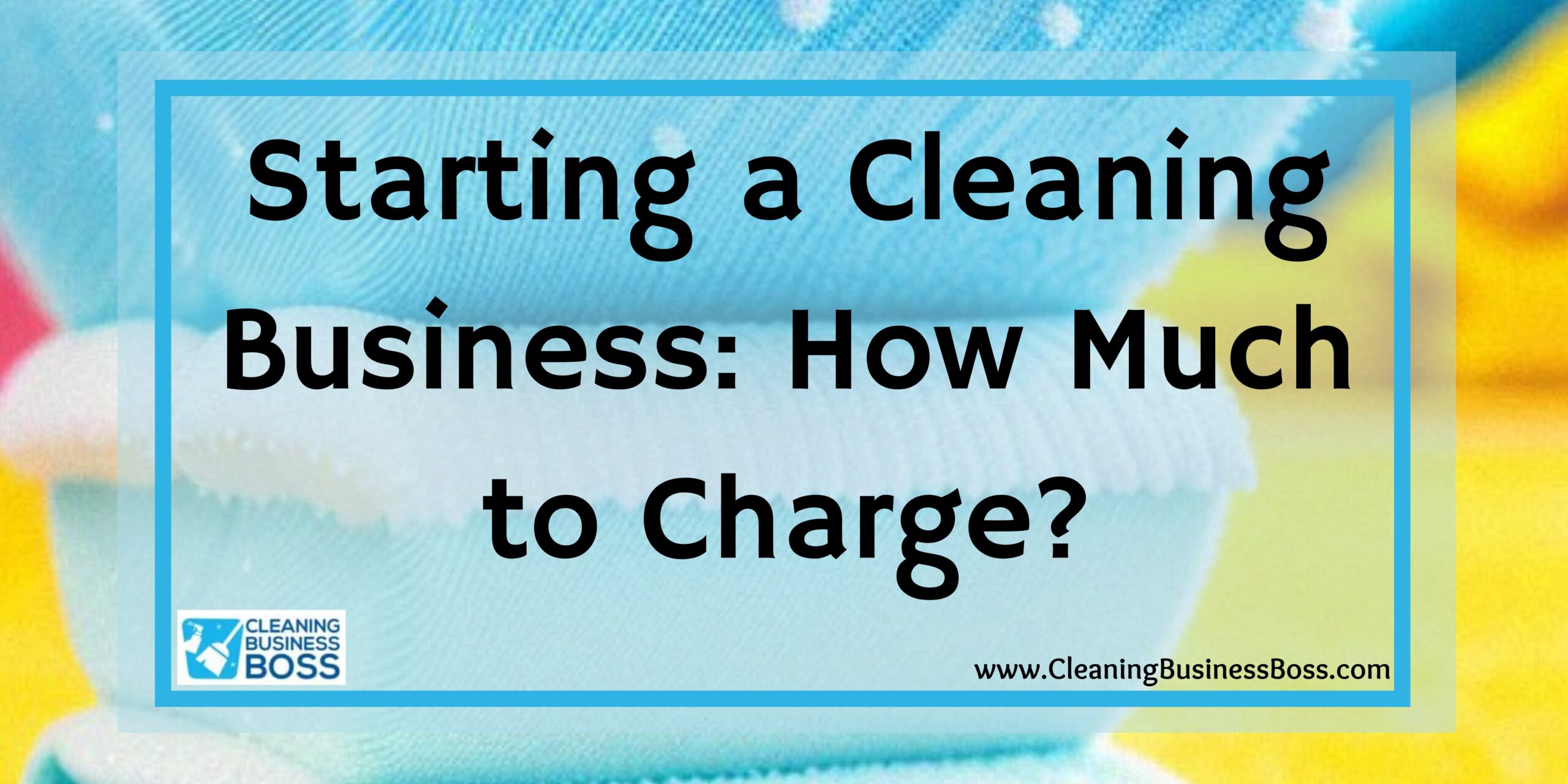When you’re starting a business, cleaning or otherwise, one of the first questions you need to answer is how much you’ll be charging your customers. If you’re making a pitch to potential investors or business loan officers, the prices you have will be among the first things you say. However, arriving at a price point isn’t always easy. If you’re looking for an article to give you a concrete amount you should charge, I’m sorry to say I can’t help you with that. There are too many variables. What I can do is discuss some of the variables that will go into your pricing decisions.
To find out how much to charge for your cleaning business you need to take into consideration:
- The Local Cost of Living
- Your Target Market
- Transportation and Supply Costs
- Employee
- How Much You’re Being Asked to Do and How Much You’re Being Asked to Clean
- The Competition
One of the things that will go into your price plan is your local cost of living. Depending on where you are, it can vary wildly. The cost of living includes things like food, water, housing and any other living expense. If you’re living in a major metropolitan area on the coast or an affluent suburb, you’ll need to make more money to support yourself and invest in your business than you would if you lived in a small town in the Midwest. If you have children or a family member that depends on you, that will also be a factor in your prices.
You must also consider the cost of living for your customers as well. If you’ve targeted people living in areas with a high cost of living, you can afford to charge more. If you’re in an area with a lower cost of living, you probably won’t get far charging San Francisco prices.
Looking for electrostatic sprayers? Check out this article to know some of the best.
Your Target Market

Another question that is important to ask is who you intend to serve. Some target markets can afford to pay more than others. If you’re targeting elderly people who can’t clean for themselves, you’ll have to adjust your pricing expectations. Targeting the elderly can be a good strategy but there’s a problem: Many elderly people live on fixed incomes and may not be able to pay high prices.
On the other hand, if you’re targeting people with money for things like yachts and vacation homes, you can potentially charge higher prices. However, there is a lot of competition for these, clients so you can’t go overboard.
The best strategy is to try and target a mix of people so you can build up a loyal clientele that can stomach a small price-hike once in a while.
Transportation and Supply Costs
One of the challenges of having a business that visits homes instead of running a brick-and-mortar business is that you have to factor in gas costs. Not to mention the costs of keeping the vehicle in working order. Preventative maintenance (and a good car insurance plan) are key if you want to succeed in business. Preventative maintenance is cheaper than having your car put out of commission by a major long-term problem. That said, preventative maintenance does cost money and time.
You’ll also need to factor in gas. People whose businesses rely on house calls don’t have the luxury of driving a compact car. If you’re doing a lot of house cleaning, you’ll need to be able to have all your supplies in your truck. You can’t depend on your clients having them. So you’ll probably be driving a van. Many vans don’t have good gas mileage. You’ll also have to do a lot of driving. Most house cleaners cover clients in a large area (like an entire county). You can expect to put a lot of miles on your vehicle on the most productive days.
You’ll also need to have supplies and good ones. If you’re cleaning a mansion, you can’t use low-quality cleaning solution you bought from the dollar store. Your supplies like brooms and dusters will need to be durable and maintained too. Chances are that you’ll need to replace them frequently since you’ll be using them far more than your average homeowner.
Employees

It’s probably early to be thinking about employees unless you’re hiring a family member but if you do get employees, you’ll have to factor them in. They need to eat too and housecleaning is a dirty and sometimes hazardous job. You’ll need to pay them well if you want to keep good-quality employees on the payroll. If you’re using certain software that tracks hours, you’ll have to pay for that too.
There’s also a lot of paperwork involved with having employees that will take up a decent chunk of your time. Things like taxes and payroll forms. If you’re offering health insurance and other benefits, that will also cost money and will factor into how much you need to charge to turn a profit.
How Much You’re Being Asked to Do and How Much You’re Being Asked to Clean
One major factor in how much you should charge is how much you’re being asked to do and how much you’re being asked to clean. This can vary from client to client. Some just need assistance cleaning things they can’t reach on their own. An elderly or disabled person might need someone to help clean kitchen cabinets or high shelves. Some may not be able to physically get down on their knees to scrub the bathtub. Others may just need some light help with the housework (and perhaps just want some company).
Others need the full package. They need all the cleaning done. They need floors cleaned, counters washed, dishes and laundry done, and any number of other things. These people may be old/disabled or busy. You can potentially charge these people more.
The other factor is how many rooms you’re being asked to clean. Some people may need one or two rooms cleaned. Others have big houses with a large number of rooms. A large number of rooms will eat up more of your time and more of your supplies.
Some will choose to bill by room and others will choose to charge by hours spent. Which method you choose is up to you.
Your Competition
One final factor you’ll need to consider is what your competition is charging. That will give you a general idea of what you can charge in your area. You may want to start by having your prices slightly lower, however, you shouldn’t go too low.
Check out this article to know the equipment you need to start your dry cleaning business.
Frequently Asked Questions

What other reasons are there for not having my prices too low to attract customers?
The first reason is obvious: You want to turn a profit. The second reason might be somewhat less so. If your prices are too low, you might drive away customers rather than attract them. Goods and services that are priced too low often have a reputation of being lower-quality. Customers will think your lower price might come at the cost of quality.
What are some reasons you’d drop a client?
Some clients can ask the impossible such as cleaning objects that are so stained that nothing a housecleaner has will fix them. Some people’s houses can be so neglected that it poses a safety hazard to you Other clients can verbally abusive. Some may say or do things that are inappropriate for a customer/service-provider relationship. In these cases, it is important to stand up for yourself and your employees and refuse service. The safety of yourself and your employees is more important than one customer.
To learn more on how to start your own cleaning business, check out my startup documents here.
Please note that the contents of this blog are for informational and entertainment purposes only and should not be construed as legal advice. Any action taken based on the information provided in this blog is solely at your own risk. Additionally, all images used in this blog are generated under the CC0 license of Creative Commons, which means they are free to use for any purpose without attribution.

About the author. Entrepreneur and Cleaning Business Fan.
Hi! I am Shawn and I am a happy individual who happens to be an entrepreneur. I have owned several types of businesses in my life from a coffee shop to an import and export business to an online review business plus a few more and now I create online cleaning business resources for those interested in starting new ventures. It’s demanding work but I love it. I do it for those passionate about their business and their goals. That’s why when I meet a cleaning business owner, I see myself. I know how hard the struggle is to retain clients, find good employees and keep the business growing all while trying to stay competitive.
That’s why I created Cleaning Business Boss: I want to help cleaning business owners like you build a thriving business that brings you endless joy and supports your ideal lifestyle.

